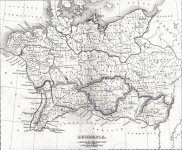while knowing more on the adriatic and baltic veneti, I do know a little about the armoric veneti.
some say that they also where from the cherbourg peninsula of Normandy , they where called Veneli
http://en.wikipedia.org/wiki/Unelli
Caesar and some roman historians said they where associated with the armorica veneti next door.
my guess is the veneti where called veneti by Romans because (a) they came from the sea , as in Roman word Venetus and (b) because Romans did not understand the language they spoke.
so, adriatic veneti = from illyria
baltic veneti = from letts and balts
armorica veneti = some scolars say early norse - related to the videli of scandinavia ( lombards)
My only knowledge apart from Roman text is that the phoenicians of southern Spain traded with these 'gallic" veneti for tin, which the veneti got from trade with cornwall and wales
http://books.google.com.au/books?id...CA&ved=0CEMQ6AEwAw#v=onepage&q=unelli&f=false
there is a lot written about them



